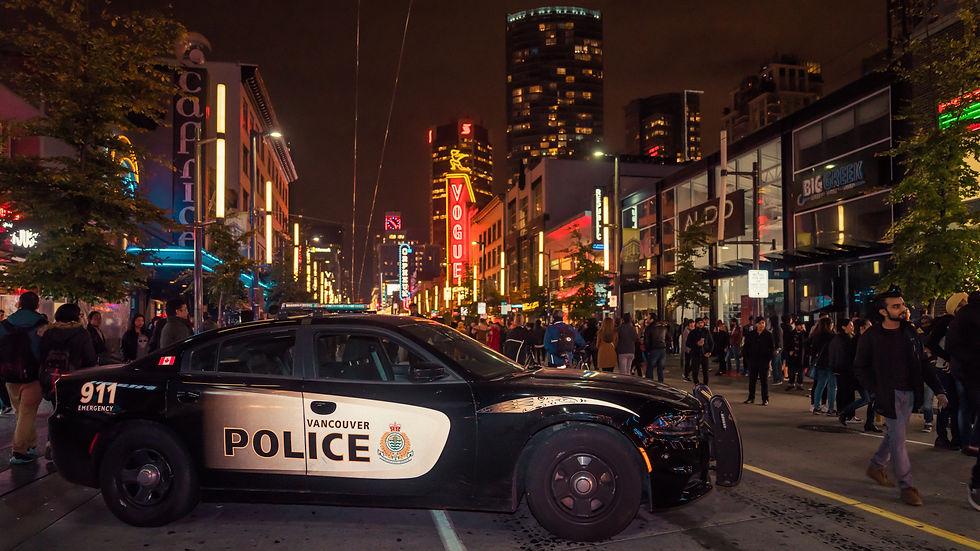A crucial lesson from the Freedom Convoy protests: Policing in B.C. too needs radical transformation
- John de Haas
- Mar 3, 2022
- 3 min read

Image source: NY Times
[Article as published on LinkedIn on March 3, 2022]
We learn the true state of our emergency services in times of crisis. The events of the past weeks in Ottawa and across Canada tested the leadership, organization and effectiveness of our police. We saw many initial failings: inadequate threat assessments, insufficient preparation, and unsettling inaction. In Ottawa, in the midst of deteriorating public order, the Chief Constable resigned, the police board was befuddled, and meaningful leadership disintegrated. At border crossing blockades the nation was held hostage and police appeared impotent. We were confused, alarmed, and angered. Our confidence in those responsible to keep us secure was shaken.
British Columbia’s policing model is really no different than in Ontario, Alberta or the other provinces. Our policing system is equally designed to fail. It too is a fractured structure of multiple agencies, varying levels of leadership competencies, and inept governance. There is ample evidence of organizational dysfunction and deficiency. There are the endless gang slayings across jurisdictions, the daily deaths throughout the province from illegal drugs, the recognition of a sexist culture in the RCMP, the denials of systemic racism in Vancouver, the run-down morale in Victoria, to the current tug-of-war over who will police Surrey.
And there have been signs of troubles for decades; such as the tragic mishandling of serial killers Robert Pickton and Clifford Olsen, the overwhelm of disjointed police resources in the chaos of two Stanley Cup riots, and the deception following the death of Robert Dziekanski at the airport. Each debacle has gotten some form of token review – always by someone who knows virtually nothing about the true depths of policing. Then there followed some finger-pointing, or someone punished so that ‘accountability’ could be declared, or a little tinkering to policy to suggest that something has been fixed - like the recent revised Vancouver ‘handcuff policy’. As if a scolding and a few written words would solve the real deeper underlying causes. Then we moved on.
The repeated messages of systemic police shortcomings no longer seem to alarm us. They have become the white noise in the background that we just ignore. Is it because dealing with policing seems just too much; too complicated, too time-consuming, or involving too much resistance? And so, policing remains divided, financially wasteful, operationally inefficient, and at times deadly ineffective. As a collection of disparate public service monopolies, costs are uneconomical, productivity inconsistent, service levels variable, and careerism rampant. It is time for sweeping change.
The following provides several ideas for change of key policing components that I and many other experts in the field see as necessary for axiomatic reform:
Structure, organization and funding – From the parochial fiefdoms of multiple starkly different sized municipal police forces, along with an assertive RCMP ‘contract’ policing scheme; To one unified and cohesive provincial police agency. From costly multiple budgets to one, from inequitable services to consistency, from inefficient deployment and work distribution models to a rationalized and fully integrated model.
Governance – From disempowered civilian boards made up of temporary appointees representing community diversity, but without knowledge of policing or of governing organizations, along with the distant federal command of the RCMP; To direct and centralized administrative control by the provincial government. With the caveat shared by other justice system components, that investigative decisions remain fully independent of government.
Leadership – From an under-trained, under-informed and self-interested management ethos; To mandatory training and career-long development which create a strong and sophisticated public-service oriented leadership. From administrator and follower to leader.
Culture - From the entrenched alarmist defense of the status quo that resists change and stagnates policing; To training and human resource practices which generate and reinforce an engaged, thoughtful, innovative and proactive ideology.
Accountability – From a civilian conduct review system that is corrupted by self-interest and is destructive to officer morale, public trust accountability and public confidence; To, as Justice Tullock of Ontario has recommended, a professional regulatory college that is proud, trusted and effective. From exterior watchdog to inspired self-discipline.
There is of course much good to be said of our police, yet, we have been complacent far too long over their failings. Each of us have occasions in our lives when we need the police. In these times of crisis frontline officers and the organization and culture that shape and support them ought to be at the top of their game. Mere days ago, we experienced once more that they are not. Let us not again ignore the lessons right in front of us.
We need the provincial government’s ownership, leadership and action. Since the symptoms of deep malaise have been ignored for so long, just what will it take to get their proper attention?




Comments